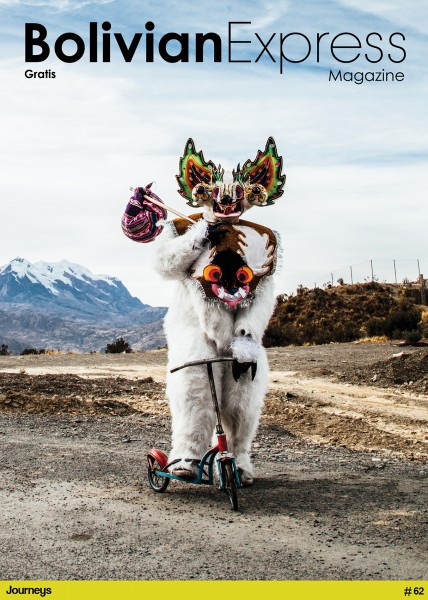
For most travellers who visit, Bolivia is not a place to sit still. The country offers a variety of must-see and must-do attractions that are spread out across far-reaching distances. Many backpackers here grow accustomed to the 12-hour overnight bus ride. The Salar de Uyuni, the jungle rivers outside of Rurrenabaque, the shores of Lake Titicaca, the colonial architecture of Sucre – any of the most visited destinations in Bolivia are found in all corners of its tremendous geography.
One cannot stay put in one city or location and come close to understanding what Bolivia is. To truly learn about Bolivia is to travel across it, to experience the variety of wonders it has to offer the adventurous visitor. It is in this process of travelling to other destinations that, along the way, you see the true Bolivia – the sleep-deprived bus driver; the friendly kiosk owner at the crossroads; the passenger next to you finally making the trip home after a semester at school. Sometimes the seemingly endless bus rides here feel like a blessing, given the opportunities to meet new people and to take in a variety of landscapes. For certain, these travels are central to the Bolivian experience.
In this issue of Bolivian Express, we looked at various journeys, both physical and metaphorical, to understand the variety of paths people in Bolivia have taken. We traveled by train across the altiplano, from the mining city of Oruro to the salt flats at Uyuni. We heard legends of great explorers who came to Bolivia in search of riches, and sent our writers out to find their own treasures along the Choro Trial and among La Paz’s culinary hotspots. We danced with our neighbors through the barrios of La Paz to celebrate the cultural history and tradition of Gran Poder. We explored the everyday-life journeys unique to Bolivia, from the process of becoming an adult to the taking of the streets by underrepresented corners of society desperate to have their voices heard. We even traveled outside this country to experience the culinary and cultural hotspots of other places to better understand the wonders found here.
In all our journeys taken to create this issue, we returned home with a better understanding of Bolivia, and hope to share our findings with you here. Most importantly, we understood that this is a large country, and it is important that those who come here give themselves the opportunity to see wide swaths of it, to not just stay in one place and call that Bolivia. Hopefully, this issue of Bolivian Express will be a reminder that the joy is in the traversing. The journey isn’t just arriving from Point A to Point B; it is everything in between.
Journeys of a Restless Traveller in South America
Image: Valeria Wilde
An eventful journey, a nomadic paradise, a transient hell – travelling is many things. But one thing remains certain: the traveller is always on the move.
It’s part of the game, and a game for many it becomes. Imagine the great continent of South America as a Monopoly board. The aim is to collect the properties – or, in this case, countries – of greatest value.
The start of the board would see the not-so-oft visited countries of Suriname and Paraguay, widely said to be void of ‘wow’ factors. The safe bets, those invested in by many and bound to pay off, would be the backpacker favourites of Peru and Argentina.
The big hitter comes in the form of Colombia. On the rise, famed for beautiful coastlines and even more beautiful people, those who fail to add this to their collection are definitely missing out.
And Bolivia? Underestimated by some, most of the country is largely ignored, but it boasts a variety of backpacker must-do attractions. Worth a trip, some may say, but just a trip.
Hang around longer in any of these countries, though, and an attachment will be formed. Letting go of this attachment is the complicated part, as I found out…
The bluish tinge of a fiery newborn sun rising above the otherwordly salt flats; the composed reflection of a more mature blaze shining in the crystal waters of Lake Titicaca; the golden lights of a city asleep twinkling below the towering cable cars of La Paz; an aesthetic heaven. Bolivia has gifted me with sights that will stay with me for years, and memories that will last for significantly longer.
I set down roots. Yet feeling settled, finding a routine and building a normal life of sorts is not how you play this game. It was time to move on, to continue playing. After all, I never was one for losing. My next stop: Colombia. I knew Colombia was a strong contender in the running for South America's ‘best’ country, but I couldn't help but feel skeptical as to how it would compare to the country I was regretfully leaving. Or if it would compare at all.
Colombia didn't compare. After all, how could two such unique countries ever hope to do so? I showcased my lack of rhythm surrounded by passionate, whirling figures in a lively salsa bar in Cali, wandered between waxy palms on the green slopes near Salento in the coffee region and stumbled from tropical jungle onto golden sands and into the Caribbean sea in Tayrona National Park. Safe to say, my regret dissipated.
In the search for comparison lay my error. Why did I feel a need to determine a ‘favourite’? As if countries were horses jostling for the lead at the Grand National, football teams competing for top of the table or, of course, properties to collect on a Monopoly board. I concluded that life isn't a series of comparisons, and that difference doesn't automatically qualify for better or worse.
After a well-welcomed return to Bolivia, the time approaches for me to say my renewed goodbyes to this country, a place that has been so kind to me, in which I have learnt so much and have regretted so little. What will stay with me most are the intangible impressions, the arbitrary encounters and the vivid sense of culture. Such non-concrete things, I have discovered, render comparison utterly futile.
I'm glad I didn't just pass through, and I know deep down that my despedida will be more of a hasta luego. ‘Competitive’ travellers may view this as time wasted. After all, there are more renowned properties to collect. At this rate, my collection may well remain small, but to hell with winning—I’m happy with my lot. In fact, I know I am not losing at all.
The Local Road to Adulthood
Illustration: Richard Sanchez Jaillita
Growing up is never easy. Around the globe, we have witnessed the so-called Peter Pan generation increasingly put-off adulthood and refuse to leave their cocoon. In Bolivia, however, things are slightly more complicated.
Alvaro Saico is a seventeen-and-a-half year old paceño who has shouldered some of the responsibilities of adulthood since the age of eight. He started working by helping his mother sell candy in the buses going to Los Yungas. After some years, he sold arroz con leche in El Alto, across town from his neighbourhood, Villa Fátima. He has worked as a voceador in minibuses around the city and, in his last job, he distributed pamphlets in the streets.
Shortly after he started working, Alvaro joined UNATSBO, the National Union of Working Children and Adolescents of Bolivia, which is an independent union that aims to defend the rights of this group of workers. At nine, he joined the departmental branch of the union and by ten, he was a delegate from the Children’s Union of Villa Fátima, a position he holds to date.
Alvaro says that the youngest member of his group is six years old. This precocious group of working children and adolescents have come a long way in learning how to lobby and influence public policy. They have learned to forge alliances with the government and to negotiate rates and commercial spaces with the competency of an adult. They have also mastered organisational skills. These young workers make time for study, work, leisure, and for their union meetings. Sadly, they suffer constant abuse from grown-ups and the police while working, along with the discrimination and lack of protection from society in general.
In Bolivia, there are approximately 500,000 children like Alvaro. Unlike him, some of them do not have a family or a house to live in. Nevertheless, Alvaro says he has fully experienced childhood instead of losing it. So, does his life experience make him an adult?
Sociologists everywhere have tried to map the coming of age using markers: completing school, leaving home, gaining a secure job, getting married and having children. But adulthood is hardly a fixed concept. It varies from culture to culture and differs in meaning all over the world. One thing is for sure, though, adulthood is always synonymous with increased responsibility.
Escaping the responsibilities of adulthood is characteristic of the Peter Pan generation, which in the United States represents three million 20-to-34-year-olds who live with their parents. Young people across the world are experiencing a similar reality, since the milestones of adulthood have become more and more difficult to meet in recent years. In La Paz, the rising prices of housing and the growth of the urban centre have made finding a house – and being able to afford it – almost impossible. As in other countries, employment in Bolivia has become less stable over the past thirty years, with few people having jobs for life now. This has undermined young people’s ability to gain independence from their parents. People get married later, they move out later and they have children later. In short, doing the things that make you an adult is getting harder.
In Bolivia, the cultural expectation is for people to live on their own only when they are married, especially in the case of women. The Andean concept of chacha-warmi defines adulthood as that which makes a person complete, and thus a citizen, through his or her formal union with a partner. Moving out in Bolivia represents a big change. It intertwines several markers of adulthood.
This phenomenon could be rooted in the tight family bonds common to Latin American cultures, but it is also tied to the undeniable economic challenges that younger generations face in the country. The local Peter Pan generation – those between the ages of 20 and 34 – almost certainly live with their parents. It is a common practice in Bolivia to build a place big enough for the whole family; a place with enough room for all the children and their future offspring. Renting or buying house near your parents is an adventurous equivalent that has become common in big cities.
Alvaro’s case highlights the paradox that lies at the heart of coming of age in Bolivia. Not only is Bolivia experiencing many of the same issues with the Peter Pan generation as the rest of the world, but it is also home to a group of youngsters who are thrust prematurely into adulthood and forced to deal with the responsibilities that growing up necessarily entails.
It is hard to believe that youngsters like him are only about to reach the legal age of adulthood. Álvaro finished school last year and is now studying accounting, although he wishes he could become a lawyer. He says he wants to bring change to this country from his experience rather than from desk-work. His goals adhere to the markers of adulthood outlined by sociologists, but he has arguably faced enough adversity to last him a lifetime, or rather, a complete adulthood.

 Download
Download





















